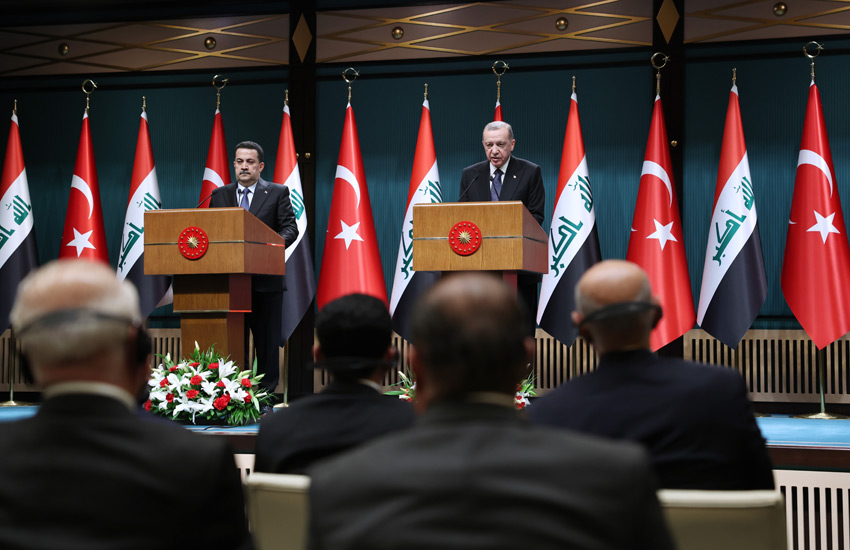When President Recep Tayyip Erdoğan hosted Iraqi Prime Minister Mohammed Shia Al-Sudani at the Presidential Complex in Ankara on March 21, they disclosed that they have tasked their concerned ministers to work on the Development Road (Dry Canal) that will pass through Iraqi and Turkish territories. The Development Road will be 1,200 kilometers (745 miles) long consisting of railways, motorways and pipelines, starting from Basra’s Faw Port to Turkish Mersin Port. The railway route alone will be able to transport 3.5 million tons of goods in the first phase and 7.5 million tons in the second phase. Both leaders are keen to start the project and have it operational as soon as possible.
The Development Road, also called the “New Silk Road,” is expected to cost $20 billion (TL 385 billion). When completed, the project will boost the Iraqi economy as it will be a new way of connecting the East to the West as an alternative to the Suez Channel. Türkiye will also strengthen its feature of being a transit hub by offering a new route between Asia and Europe. The road is also expected to connect Gulf countries, Jordan, and even Iran to Europe.
Obstacles
However, there are also obstacles to the project. First, though the Development Road will be beneficial for Iran, it may not allow the Iraqi government to complete it as the project ignores Tehran’s plans of accessing the port in Basra and Syria. In addition, whether the U.S. administration will enable the project is another matter of concern. Besides, Iraq cannot afford the project with its current budget and thus needs foreign investment.
Perhaps, the most important obstacle is the existence of terrorist organizations and militants on Iraqi lands. When the road is ready for use, the vital problem will be the security of the transportation. Daesh, the PKK and armed groups will most probably conduct attacks on the road. To what extent the Iraqi security forces can prevent attacks is a matter of question.
It seems that Iraq will suffer from its current insecure environment. However, struggling for the future of the country is the only remedy; so much so that even if the government fails in the end, it will not shy away from the efforts. In fact, success is not a far reach for Baghdad. Something that the Iraqi government should do is ensure the security of construction followed by its utilization. It is no secret that armed groups located in Iraq are more potent than the Iraqi army. What is worse, such groups operate as proxies of foreign powers. Besides local militants, terrorist groups are another threat to Iraq’s giant projects.
Hence, the reasonable solution might be to award the job to a foreign company or companies whose governments can provide security for the project. A condition for the bidder must be convincing its government to protect its business in Iraq. Many governments will probably welcome such a provision as the revenue to be generated from the construction is quite high. Giving a stake in the project to the constructor(s) or building it with the build-operate-transfer method might be good ideas to sustain the Development Road.
Türkiye’s role
As for Türkiye’s role, Bahgdad can collaborate with the Turkish government, particularly in northern Iraq, by joining the Turkish army’s operations against terrorism. Türkiye has no problem with Iraq and relations could be better if there was no PKK presence on Iraqi territories. As the Development Road project reveals, terrorism hurts Iraq as well.
If there is a terror group on your territory, it suggests that you do have not enough power to eliminate it. Iraq admits that it can not fight the PKK amidst its other problems. However, it can participate in the Turkish army’s efforts to oust the terrorist organization so that an important obstacle to the project can be removed. Türkiye can also help the Iraqi government fight Daesh and other armed groups.
Overall, an insecure environment is a major threat to Iraq’s projects that could brighten the country’s future. Baghdad should establish good security and commercial allies to realize its projects. A group of great and middle powers can ensure the materialization of the Development Road and other projects. What the Iraqi government should do is act a bit more subtly.
Source: Daily Sabah






